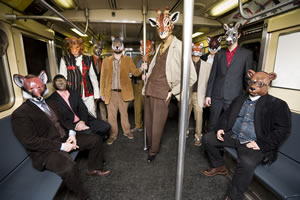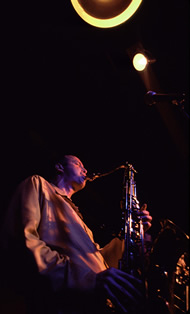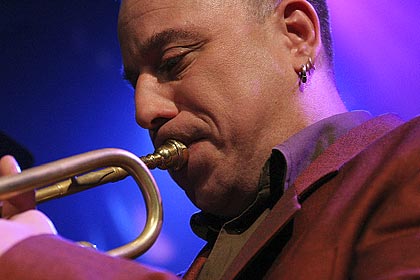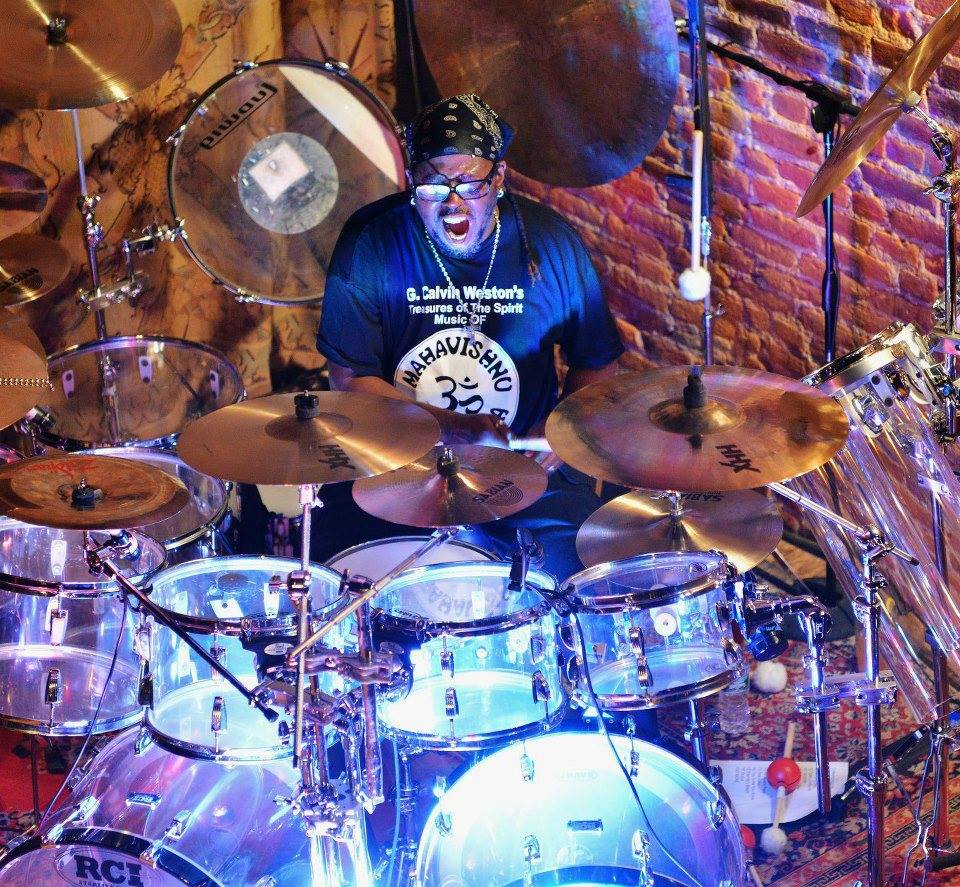Sep
25
with Antibalas, Michael Blake, Sexmob @ 20, Marcus Rojas Brass Ensemble & Calvin Weston
Thu September 25th, 2014
9:00PM
Main Space
Minimum Age: 18+
Doors Open: 8:00PM
Show Time: 9:00PM
Event Ticket: $25
Day of Show: $30
happy hour
September 25th will feature renditions of The Lounge Lizards’ music performed by the great Antibalas and Hellbent (Michael Blake, Steven Bernstein, Marcus Rojas, and Calvin Weston). Stemming from Lurie’s interest in African music, the concert will feature Antibalas performing afrobeat interpretations of Lurie’s music.
As part of Strange and Beautiful: The Music and Art of John Lurie festival
Interview with John Lurie on Pleasekillme.com
This is a general admission, standing event. Happy hour from 8-9pm including $3 beer and $5 well drinks.
1
5
Strange & Beautiful: Antibalas and Hellbent perform the music of John Lurie & The Lounge Lizards

Antibalas

Jordan McLean is a New York City-based trumpeter, composer, arranger, bandleader, producer and educator. He has been active in the professional music world since 1992, having performed, recorded and collaborated with a multitude of musicians, ensembles and performance organizations around the world, from Ornette Coleman to Public Enemy. Jordan graduated summa cum laude with a degree in composition from SUNY Purchase, is a charter member of Antibalas, served as Associate Music Director on the TONY Award winning musical FELA!, and is co-founder of System Dialing Records.
“Rhythm is what makes a good Afrobeat record,” says Gabriel Roth, Daptone Records co-founder, producer and connoisseur of all things funky. “Not just the rhythm section, but the rhythm of the horns, the rhythm of the vocals, the rhythm of the keyboards, everybody’s rhythm. It’s not just being about being right or wrong in your rhythm, or being good at it, but it’s about feeling something the same way, swinging the same way, anticipating things the same way, and hitting things the same way – everybody hearing music the same way, and being able to turn all those instruments into one voice.
***
“Antibalas is the only band that can do that, right now. That’s why they’re still at the front of the scene, after all these years.”
Fourteen years after their first gig, and five since the release of their last album, 2007’s Security, Antibalas – Afrobeat’s premier second-wave ensemble – are back with their fifth full-length release. Simply titled Antibalas, the album is both a blazing reaffirmation of the NYC band’s collective musical strengths, and a hard-hitting continuation of their funkified excursions into what Antibalas founder and baritone saxophonist Martn Perna calls “our vault of esoteric sounds and knowledge.”
“We kicked around a couple of different titles,” Perna explains, “but we could all agree on Antibalas. We’re always who we have been, and this is what we are and what we’re about, without any frills. If you’ve never heard any of our albums before, this is the one to listen to.”
“Musically, it’s our best playing as a band,” says trumpeter Jordan McLean. “We’re having more fun together, we’re all breathing in sync, the structures of the compositions and the overall sound are tighter, and the band is sounding better than ever.”
Recorded over a two-week period at Daptone’s House of Soul Studios in Brooklyn with Roth at the helm, Antibalas is the first Antibalas full-length to be released on Daptone, which – given Antibalas’ deep- and long-running ties to the label – brings things kind of full-circle for the band. Antibalas has shared past and present members with several outfits in the Daptone stable (such as Sharon Jones & the Dap-Kings, Menahan Street Band and The Budos Band), while Roth was an original member of the band, and produced the first three Antibalas albums. “Making this record was like going back and playing basketball with all your high school buddies, or something,” says Roth.
The “family reunion” feeling on Antibalas is further bolstered by the return of original guitarist Luke O’Malley, who contributed “Dirty Money,” the album’s effervescent opening track. “Luke O’Malley has an amazing sense of music,” says tenor saxophonist Stuart Bogie, “and ‘Dirty Money’ is a perfect example of that. But he’s also such a hilarious and inspiring person, who leads with just kind of a blind energy into everything he does. He’s very much a reason why everyone in that room is there.”
“We’ve woven ourselves together musically, but also personally,” says Perna. “It’s a community that has existed as Antibalas for 14 years now, and if you go back to when Gabe and Luke and I started making music together, it goes back to ’94.”
According to Perna, a little-known but tasty morsel of music trivia is the fact that TV on the Radio, The Dap-Kings and Antibalas all began in the same apartment – a decrepit old factory loft at 132 Havemeyer Street in Williamsburg. “Gabe, Tunde Adebimpe and I were all living there at the time Antibalas was getting started. The Dap-Kings were called the Soul Providers at the time; that was just getting off the ground. Tunde just finished at NYU and was doing animation stuff at the time, and we would mess around on the cassette four-track and make little songs. And then Dave Sitek moved into the loft, and he and Tunde started making music. So this little liminal space was so fertile with friendship and creative imagination, and this shared sense of struggle that was manifested in three musical groups that have made a pretty strong impact on America in different ways.”
Originally conceived by Perna as a cross between the NYC Latin funk grooves of Eddie Palmieri, Harvey Averne and Mandrill and the Afrobeat jams of the late Fela Kuti, the music of Antibalas gradually shifted towards the Fela side of the equation. “As we got deeper into Afrobeat, we realized that we were juggling a lot of things, and kind of need to have only one thing on our plate,” Perna recounts.
“At the time, there was not a lot of interest in Afrobeat, or in Fela, per se,” adds Roth. “Because of that, a lot of people looked at Antibalas as pioneers in this second wave of Afrobeat that kind of blossomed around the world. There are great Afrobeat bands now in Brazil, in Chicago, in England, in a lot of places, and I think a lot of those bands looked to Antibalas, alongside Fela, as one of their real inspirations.”
Through their concerts, tours and recordings, Antibalas have helped re-popularize the classic Afrobeat sound, in the process earning the admiration of a wide array of respected musicians, including everyone from Questlove and David Byrne to Fugazi’s Ian MacKaye and John Frusciante of the Red Hot Chili Peppers. Much in demand as collaborators, they’ve performed as a band in the studio and on stage with such artists as Medeski Martin & Wood, The Roots, Public Enemy, Paul Simon, Amadou and Mariam, and Fela’s son Femi Kuti, to name a few. In 2007, following the release of the band’s last album, Security, Antibalas’ Afrobeat expertise led to the involvement of several band members – including trombonist Aaron Johnson and Jordan McLean, who respectively served as Musical Director and Assistant Musical Director – in Fela!, Bill T. Jones’ musical based on the life of Fela Kuti, which eventually went on to a successful Broadway run, earning eleven Tony Award nominations and three wins.
But Fela! wasn’t the only thing keeping Antibalas busy between Security and sessions for the new album; in addition to playing about 50 shows a year across the globe as Antibalas, the band’s members have individually recorded and/or performed with TV on the Radio, Iron and Wine, Amy Winehouse, Mark Ronson, Sharon Jones & the Dap-Kings, The Roots, Angelique Kidjo (whose 2007 album Djin Djin earned the Antibalas Horns a Grammy Award), Ornette Coleman, David Byrne, Miike Snow, St. Vincent, Gomez, Wale, Spoon, The Black Keys, Imogen Heap, Lee Fields, Melvin Gibbs, Sugar Minott, Patti Smith, Sierra Leone’s Refugee All Stars, and The Budos Band, as well as devoted ample time to their (and each other’s) side projects like Ocote Soul Sounds, Superhuman Happiness, Piano Music & Song Trio, Chico Mann, and Fu-Arkist-Ra.
“During these past five years, with all the side projects, it was still all of us playing together, just not in Antibalas,” Perna explains. “We were all still locking in together, building friendships, building the musical trust, and building the sort of ESP that happens when musicians play together for a long time. It wasn’t like, ‘See you in five years!’ We’re not reuniting per se, because we were never disunited; we were just all busy with other hustles.”
That heightened musical ESP is deliciously tangible on Antibalas, much of which was recorded live in the studio to one-inch 8-track tape. “There’s very little in the way of overdubs,” reveals Roth. “A little bit of background vocals, maybe a punch here on a solo or a guitar part, but for the most part it was live. I’d done the early Antibalas records on 16-track, but this record I did on 8-track, which I was able to do because the band is playing better than ever. I could mix people together, and not worry about how I was going to take ’em apart and fix ’em later, because these guys are the baddest in the business, and they were swinging from the beginning.”
Tracks like “The Rat Catcher,” “Him Belly No Go Sweet,” “Ari Degbe” and “Ibeji” capture the band’s fiery telepathy and unrelenting sense of groove, while also showcasing their most concisely focused attack yet. From the deft rumble of the new rhythm section (drummer Miles Arntzen and bassist Nikhil Yerawadekar) to the leonine growl of longtime frontman Amayo, the band – which also includes Victor Axelrod (organ, electric piano, sticks), Marcos Garca (guitar, background vocals) and Marcus Farrar (shekere, sticks, background vocals) – sounds more locked in and self-assured than ever.
“What makes us tick, and what makes any band a band, is a shared collective idea about what the sound is,” says McLean, “and then of course on an individual level, it’s what each person brings to the band to give the band its defining sound. We have a shared idea of Afrobeat and Fela’s music, but we also have these 10 or 12 individuals who are also bringing their own heartbeat and their own perspective and their own experiences as individuals, and bringing that together to make Antibalas.”
“We love this Afrobeat, it’s important to us, it’s not appreciated enough – and making it is a transformative process in so many different ways,” says Perna. “Unlike most music that’s really ego-driven and centered around one person or cult of personality, all of us have had to learn to function with really specified roles – everyone becomes a drummer, in a certain sense. Our parts may be played on melodic instruments, but they’re part of this huge interlocking net that holds up the music.”
“What’s interesting about Antibalas is that it really is a multi-headed beast,” adds Bogie. “The last song on the album is ‘Sare Kon Kon,’ and it’s a song that has a kinetic energy that’s just racing and racing the whole time. To paraphrase the lyrics, it’s like, ‘We’re running, we’re running, we don’t know where we’re going, but everybody’s running.’ That kind of encapsulates the rushing anarchy that keeps the band together. It’s the idea that we’re all kind of on this train, and there’s no director, no engineer, no brake; everybody just has to run, and go or not go.
“It’s kind of mysterious,” he continues. “Antibalas is really a band that is bigger than any of its members. I believe that it is one of the most genuine anarchies that I have ever seen in a band. I think that’s what’s most interesting and different about the band. But I think it’s the essence of the music, and our love for it, that really brings us together.”
Michael Blake

Ever since striking out on his own Michael Blake has established himself as a leading voice in contemporary music. The Canadian born saxophonist/composer has made New York City his home for over 25 years where he consistently makes music that bristles with originality and vision. He has recorded with countless other musicians, scored music for TV and film and performed in the worlds finest concert halls and jazz clubs. The influential tenor and soprano saxophonist also lends his talents to projects led by master musicians including Ben Allison, Henry Butler, Erik Friedlander, Enrico Rava, Sam Blaser and Steven Bernstein. Last year Michael received Chamber Music America’s 2013 New Jazz Works: Commissioning and Ensemble Development program funded through the generosity of the Doris Duke Charitable Foundation. Michael recently premiered the work entitled Contrasts in Individualism: Reinterpreting the Innovations of Coleman Hawkins and Lester Young with his band World Time Zone in NYC. He was also commissioned by the Vancouver creative music organization Barking Sphinx to compose a work about the 1914 tragedy based on a socio-political struggle that resulted in the loss of life for Indian passengers aboard the ill-fated freighter Kamagata Maru. Michael will premiere the piece this summer at The Vancouver International Jazz Festival.
Michael has produced 10 CD’s as a leader, each album highlighting his talents for arranging and conceiving new material. This year Blake’s steadfast output continues with the upcoming debut of his new work Contrasts in Individualism. His 2012 release In the Grand Scheme of Things (Songlines Records) – an electro-acoustic program of originals inspired by the cycle of life that binds us all – showcases Blake’s Vancouver group the Variety Hour with mastermind keyboardist Chris Gestrin at the MOOG synthesizer. The same year Union Square (Abeat) a trio album with bassist Ben Allison and drummer Rudy Royston demonstrate Blake’s affection for both pre-bop nuance and post modernism. Michael’s 2010 CD Hellbent is from a live performance and highlights the saxophonist’s fearless improvising along side the ferocious drumming of Philly free-funkster Calvin Weston and Tuba virtuoso Marcus Rojas. Delving further into unexplored territory is Control This (Clean Feed), an engaging free-jazz duo album with the tirelessly creative Danish drummer Kresten Osgood. His 1997 debut CD, Kingdom of Champa (Intuition) is often referred to as a masterpiece. Produced by the legendary Teo Macero, it is an empathetic musical travelogue of Vietnam featuring a brilliant cast of NY players. The follow-up album Drift (Intuition) was chosen by Jazzthing Magazine’s Critics Pick as Best CD of 2000. Right Before Your Very Ears (Clean Feed) is an off-the-cuff improvised album for Trio featuring drummer Jeff Ballard. Elevated (Knitting Factory Works) would be a traditional quartet album but for Scott Harding’s ingenious production. With a cunning and young rhythm section urging him on, his Copenhagen based group Blake Tartare produced both Blake Tartare and More Like Us (Stunt Records). Two subsequent albums include forays into new waters and highlight Blake’s writing for percussion and strings: 2007’s Amor de Cosmos (Songlines) and 2008’s The World Awakes/A Tribute to Lucky Thompson (Stunt Records).
His tenure with John Lurie and the Lounge Lizards lasted from 1990-2000 and includes numerous record dates, TV appearances, a live concert film from Berlin, and film soundtracks such as the Grammy nominated score for Get Shorty. During this period he was also a Composer in Residence in the Jazz Composers Collective, a nonprofit, musician-run organization dedicated to presenting original works. Another important group he co-lead was the instrumental rock band Slow Poke. Along with David Tronzo on slide guitar, producer/bassist Tony Scherr and drummer Kenny Wollesen, Slow Poke produced two albums: Slow Poke at Home (Palmetto) and Redemption (Intuition).
Michael is a respected teacher and has conducted workshops and classes in the US, Canada, Europe, Brazil and Asia. He is on faculty at the Fondazione Siena Jazz Summer Workshop (2009-present) and teaches part time at New York University. Known for his warmth, patience, and enthusiasm Michael shares personal anecdotes, opinions, humor and more for all to read on his blog
Among the many artists he has recorded and performed with are Ben Allison, Hamid Drake, Oliver Lake, Nicole Mitchell, Kenny Werner, Greg Osby, Eric Harland, Steve Cardenas, Matt Wilson, Frank Kimbrough, Ted Nash, Steven Bernstein, Ben Perowsky, George Colligan, Grachon Moncour III, Medeski Martin and Wood, Ray Lamontagne, Enrico Rava, Stefano Bollani, Jeff Ballard, Larry Grenadier, Giovanni Guidi, Gianluca Patrella, Thomas Morgan, Gerald Cleaver, Mark Helias, Mario Pavone, Tommaso Cappellato, Bill Ware, Groove Collective, The Gil Evans Orchestra, Kamikaze Ground Crew, Jack McDuff, Dr. Lonnie Smith, Ben E. King, Chubby Checker, Neil Sedaka, Dione, Natalie Cole, Martha and Rufus Wainwright, Nick Cave and Pinetop Perkins. He has worked with such luminary producers as Teo Macero, Tricky, Prince Paul, Hal Wilner and Sir Coxsone Dodd.
Michael Blake official site
Sexmob @ 20

Steven Bernstein – slide trumpet / Tony Scherr – bass / Briggan Krauss – saxophone / Kenny Wollesen – drums
Marcus Rojas Brass Ensemble

“Phenomenal tubist Marcus Rojas” (Whitney Balliet, The New Yorker) is a native of New York City. Considered one of “the best all around tuba players in the world” (Harvey Pekar,Jazziz); among the diverse groups in which he has played are the Metropolitan Opera, New York City Ballet, New York City Opera, American Symphony, American Ballet Theater, Joffrey Ballet, Orpheus Chamber Orchestra, the New York Pops, EOS, Radio City Music Hall, Lester Bowie’s Brass Fantasy, Charlie Haden’s Liberation Music Orchestra, the Art Ensemble of Chicago, Jazz at Lincoln Center with Wynton Marsalis, ensembles led by Gil Evans, George Russell, Jim Hall, Lionel Hampton, Dave Douglas, Wayne Shorter, David Byrne, and P.D.Q. Bach. He has also appeared on the Late Show with David Letterman, The Daily Show with Jon Stewart, the Today Show, Saturday Night Live and The Grammys from New York City.
Marcus has played on over three hundred and fifty recordings, from CDs of his own groups (Spanish Fly and Les Miserables Brass Band) to Reggae stars Sly and Robbie and the Metropolitan Opera. He has performed and/or recorded with such diverse artists as Michael Jackson, Ray Charles, Paul Simon, Stevie Wonder, Dawn Upshaw, Queen Latifah, Donnie Osmond, Sting, Dr. John, Harry Connick Jr., Aretha Franklin, Bette Midler, They Might be Giants, Arto Linsday and Rosie O’Donell among others. He has recorded for every major film, television and record company in the United States as well as countless commercial jingles and over 60 film scores including Wolf, Interview with the Vampire, Mission to Mars, Muppet Christmas Carol, Ed Wood, You’ve Got Mail, The Spanish Prisoner, Fargo, Snake Eyes, Primary Colors,101 Dalmations, Shaft, S.W.A.T., American Splendor, Everything is Illuminated, Sleepless in Seattle, Sin Nombre and Across the Universe. He can be heard daily on Nick Jr’s. Oswald and the Backyardigans.
Calvin Weston

G Calvin Weston was born June 6, 1959 in Philadelphia, PA. He became interested in drums at the age of 6, when he (and his neighbors) discovered his talent for rhythm as he beat on every car on the block. He lived in North Philadelphia where he saw musicians like Stevie Wonder, The Jackson Five and James Brown at the Uptown Theatre. Seeing his attention focused on the drummers, his Father bought him a small set. In high school Calvin learned to read music and played second snare in the drum ensemble. He co-founded the group Bad Influence which played in cabarets and clubs around Philadelphia.
At 17, Calvin joined Ornette Coleman’s Prime Time Band, with bass player Jamalaadean Tacuma, his close friend from Philly, which toured extensively in North America and Europe. After recording four albums with Prime Time, Calvin went on to play and record with guitarist James “Blood” Ulmer, until he joined John Luries Lounge Lizards in 1990.
During the late ’90s Calvin recorded and toured with Billy Martin of Medeski Martin and Wood, Tricky, Eyvind Kang, Derek Baily, Mark Ribot, and James Carter. He also played on several movie soundtracks including “Get Shorty.” For his latest project, Calvin Weston’s Big Tree, Calvin explores the many musical influences of his career as band leader and composer.
He also has a new band with world guitarist, Vernon Reid and bass player, Jamalaadean Tacuma and formed the group freeformfunkyfreqs and there new CD Urban Mythology Volume 1. He also plays with Jean-Paul Bourelly and Melvin Gibbs in the band called Gypsys Reloaded, that toured in March of 2008 and recorded a live CD at the Bimhuis. G. Calvin Weston has played on many recordings including Asmodeus: Book Of Angels Volume 7 with Marc Ribot, Trevor Dunn, and John Zorn.
Calvin Weston on Facebook
Calvin Weston on Myspace

